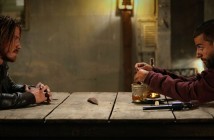
Editor’s Notes: 13 Hours: The Secret Soldiers of Benghazi is currently out in wide theatrical release.
To Libyans, Benghazi a centuries-old port city, the site of recent strife, one of the keys to controlling Libya’s economy, but to American, right, left, or center, Benghazi has become synonymous less with foreign policy than with domestic politics and a national political party dedicated to injuring the current president’s reputation and sabotaging the presidential aspirations of former Secretary of State Hilary Clinton. There’s no dispute, however, that on September 11, 2012, al-Qaeda-aligned militants attacked the lightly guarded diplomatic compound and a nearby covert CIA annex, leaving four Americans dead, including U.S. Ambassador Christopher Stevens, a senior member of his staff, and two private security contractors (both highly trained, former members of the U.S. military), in a pitched battle that stretched across 13 hours, hence the title of Michael Bay’s latest, ultimately an unsuccessful foray into adult-oriented, self-consciously serious filmmaking, 13 Hours: The Secret Soldiers of Benghazi.
13 Hours not only gives Bay the opportunity to unabashedly celebrate the military, but engage in the tech and military fetishism

The subtitle, of course, suggests anyone seeing 13 Hours in a movie theater or reading Mitchell Zuckoff’s bestselling, 2014 non-fiction book will get the “real,” objectively true story, shorn of political controversy and debate, both a tragedy because of the four American lives lost and a triumph because of the lives saved by six ex-military soldiers turned private security contractors working for the CIA’s Global Response Staff (GRS). Drawn from the U.S. military’s elite forces, Navy SEALs, Marine Recon, and Army Special Forces, they were (and are) the “best of the best,” extraordinary (Caucasian) men, the living, breathing embodiment of martial American values, of American exceptionalism and triumphalism, relying on a particular set of masculine codes, of tightly structured, heterosexual male behavior that elevates physical prowess, military competence, and self-sacrifice about critical thinking, rationality, or the muddy, murky complexities inherent in international conflicts.
Bay seems to be saying that we should leave war and nation-building to soldiers, not bungling, bumbling bureaucrats and politicians. It’s a particularly unsophisticated world view . . .
13 Hours sets the members of the GRS led by Tyrone “Rone” Woods (James Badge Dale) and the newest GRS recruit, Jack Silva (John Krasinski, The Office), a wartime comrade of Woods with private security experience, against the mostly faceless Islamic militants and militia members who conduct a well-choreographed attack first on the lightly guarded, poorly defended diplomatic compound where Ambassador Stevens (Matt Letscher) has made his temporary residence and later the not-so-secret CIA annex a mile away. Bay refuses to give Libyans anything but a cursory recognition of their (and our) common humanity, repeatedly revisiting the “Are they friends or foes?” question, minus context (i.e., post-revolution political, cultural, and social instability). We might be strangers in a strange land (theirs), but “Us/Them” places them firmly in xenophobic territory. Both predictably and reductively, the militants are driven by a blind, irrational hatred of the West (to borrow an overused conservative term, “they hate our freedoms,” and not because they might be opposed to the West’s decades-long meddling in the Middle East or multiple, extended occupations of Middle Eastern countries).
Contrary to the claim that 13 Hours isn’t and wasn’t meant to be “political” (by its nature, every war film is political), Bay has almost as much disdain and disgust for “Bob” (David Costabile), the vacillating CIA station chief more interested in following orders and protecting the CIA annex against inevitable attack. When news breaks of the attack on the diplomatic compound, Woods wants to immediately attempt a rescue mission, but Bob, venality and self-interest personified – qualities shared by politicians and bureaucrats alike – refuses, likely leading to the ambassador’s death. Help from other quarters, including Tripoli 400 miles away, doesn’t arrive as expected or hoped, leaving Woods and his men to reject inaction for the semi-successful rescue mission (they save several men, but not the ambassador) and organizing the defense of the CIA Annex from attack throughout the night. As 13 Hours winds down, Bay gives Jack the role of excoriating Bob, a non-military man, for his fecklessness, weakness, and cowardice.
Ambassador Stevens fares only slightly better in 13 Hours. He’s a naïve idealist who dreams of bringing Western-style democracy to Libya who pays the ultimate price for those misguided, ill-conceived dreams. 13 Hours has little place for either, firmly embracing the belief in military force and response. Bay seems to be saying that we should leave war and nation-building to soldiers, not bungling, bumbling bureaucrats (Bob) and politicians (Stevens). It’s a particularly unsophisticated world view, one with as many (or more) pitfalls as the opposite perspective, but Bay has no interest in exploring a granular, nuanced perspective of the Middle East or American intervention in the Middle East, but only in promoting an uncritical, pro-military point of view. 13 Hours not only gives Bay the opportunity to unabashedly celebrate the military, but engage in the tech and military fetishism (e.g., firearms of every conceivable make and model, light and heavy ordnance, videogame-inspired first-person POVs, etc.).
It shouldn’t come as a surprise then that the characters openly refer to the area outside the CIA Annex as “Zombieland, ” an area that quickly becomes a killing ground as the better equipped, if under-manned, Americans put their superior firepower and wartime experience to good use, literally leveling the playing field, picking off dozens of militants with the detached, emotionless efficiency we apparently expect from the U.S. military and proficient videogamers. A later, post-battle scene involving Libyan women mourning the dead does little, if anything, to offset what we’re expected to feel (feelings and emotions always trump thinking and rationality in the Bay-verse): Their silent wailing (Bay replaces diegetic sound with the booming, overwrought score) makes them look less human, not more, both because their mourning rituals are odd, alien to Westerners and because they’re weeping over men whose deaths should be celebrated, not mourned.
Michael Bay's latest is an ultimately unsuccessful foray into adult-oriented, self-consciously serious filmmaking.



